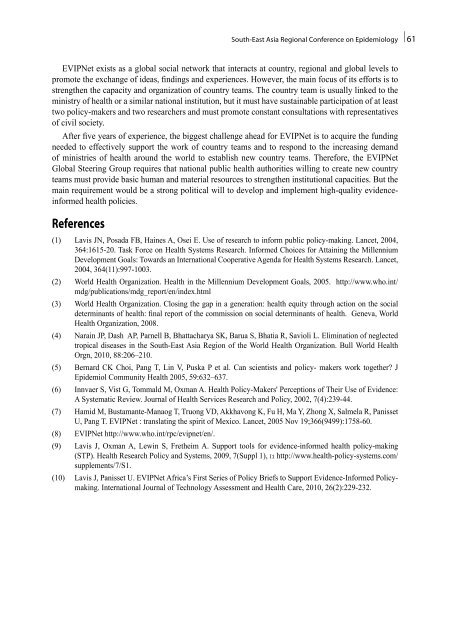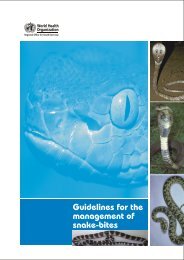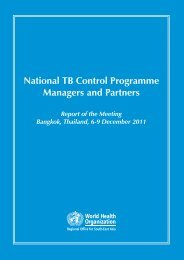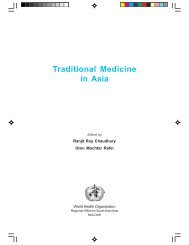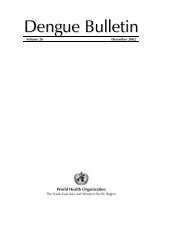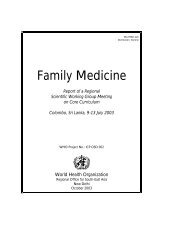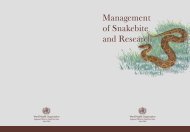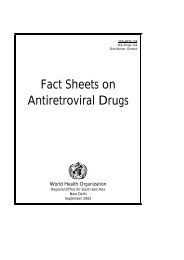South-East Asia Regional Conference on Epidemiology
South-East Asia Regional Conference on Epidemiology
South-East Asia Regional Conference on Epidemiology
You also want an ePaper? Increase the reach of your titles
YUMPU automatically turns print PDFs into web optimized ePapers that Google loves.
<str<strong>on</strong>g>South</str<strong>on</strong>g>-<str<strong>on</strong>g>East</str<strong>on</strong>g> <str<strong>on</strong>g>Asia</str<strong>on</strong>g> <str<strong>on</strong>g>Regi<strong>on</strong>al</str<strong>on</strong>g> <str<strong>on</strong>g>C<strong>on</strong>ference</str<strong>on</strong>g> <strong>on</strong> <strong>Epidemiology</strong> | 61<br />
EVIPNet exists as a global social network that interacts at country, regi<strong>on</strong>al and global levels to<br />
promote the exchange of ideas, findings and experiences. However, the main focus of its efforts is to<br />
strengthen the capacity and organizati<strong>on</strong> of country teams. The country team is usually linked to the<br />
ministry of health or a similar nati<strong>on</strong>al instituti<strong>on</strong>, but it must have sustainable participati<strong>on</strong> of at least<br />
two policy-makers and two researchers and must promote c<strong>on</strong>stant c<strong>on</strong>sultati<strong>on</strong>s with representatives<br />
of civil society.<br />
After five years of experience, the biggest challenge ahead for EVIPNet is to acquire the funding<br />
needed to effectively support the work of country teams and to resp<strong>on</strong>d to the increasing demand<br />
of ministries of health around the world to establish new country teams. Therefore, the EVIPNet<br />
Global Steering Group requires that nati<strong>on</strong>al public health authorities willing to create new country<br />
teams must provide basic human and material resources to strengthen instituti<strong>on</strong>al capacities. But the<br />
main requirement would be a str<strong>on</strong>g political will to develop and implement high-quality evidenceinformed<br />
health policies.<br />
References<br />
(1) Lavis JN, Posada FB, Haines A, Osei E. Use of research to inform public policy-making. Lancet, 2004,<br />
364:1615-20. Task Force <strong>on</strong> Health Systems Research. Informed Choices for Attaining the Millennium<br />
Development Goals: Towards an Internati<strong>on</strong>al Cooperative Agenda for Health Systems Research. Lancet,<br />
2004, 364(11):997-1003.<br />
(2) World Health Organizati<strong>on</strong>. Health in the Millennium Development Goals, 2005. http://www.who.int/<br />
mdg/publicati<strong>on</strong>s/mdg_report/en/index.html<br />
(3) World Health Organizati<strong>on</strong>. Closing the gap in a generati<strong>on</strong>: health equity through acti<strong>on</strong> <strong>on</strong> the social<br />
determinants of health: final report of the commissi<strong>on</strong> <strong>on</strong> social determinants of health. Geneva, World<br />
Health Organizati<strong>on</strong>, 2008.<br />
(4) Narain JP, Dash AP, Parnell B, Bhattacharya SK, Barua S, Bhatia R, Savioli L. Eliminati<strong>on</strong> of neglected<br />
tropical diseases in the <str<strong>on</strong>g>South</str<strong>on</strong>g>-<str<strong>on</strong>g>East</str<strong>on</strong>g> <str<strong>on</strong>g>Asia</str<strong>on</strong>g> Regi<strong>on</strong> of the World Health Organizati<strong>on</strong>. Bull World Health<br />
Orgn, 2010, 88:206–210.<br />
(5) Bernard CK Choi, Pang T, Lin V, Puska P et al. Can scientists and policy- makers work together? J<br />
Epidemiol Community Health 2005, 59:632–637.<br />
(6) Innvaer S, Vist G, Tommald M, Oxman A. Health Policy-Makers' Percepti<strong>on</strong>s of Their Use of Evidence:<br />
A Systematic Review. Journal of Health Services Research and Policy, 2002, 7(4):239-44.<br />
(7) Hamid M, Bustamante-Manaog T, Tru<strong>on</strong>g VD, Akkhav<strong>on</strong>g K, Fu H, Ma Y, Zh<strong>on</strong>g X, Salmela R, Panisset<br />
U, Pang T. EVIPNet : translating the spirit of Mexico. Lancet, 2005 Nov 19;366(9499):1758-60.<br />
(8) EVIPNet http://www.who.int/rpc/evipnet/en/.<br />
(9) Lavis J, Oxman A, Lewin S, Fretheim A. Support tools for evidence-informed health policy-making<br />
(STP). Health Research Policy and Systems, 2009, 7(Suppl 1), I1 http://www.health-policy-systems.com/<br />
supplements/7/S1.<br />
(10) Lavis J, Panisset U. EVIPNet Africa’s First Series of Policy Briefs to Support Evidence-Informed Policymaking.<br />
Internati<strong>on</strong>al Journal of Technology Assessment and Health Care, 2010, 26(2):229-232.


